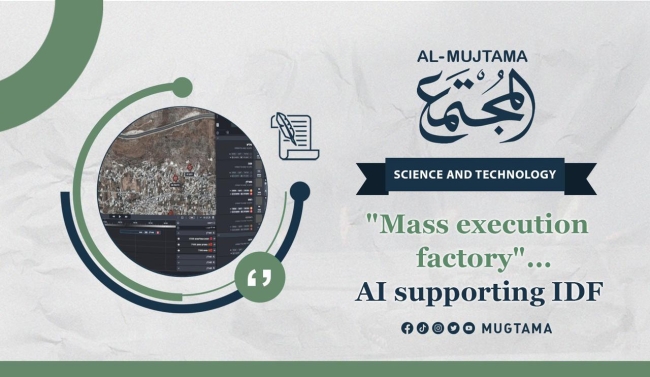"Mass execution factory"... AI supporting IDF Featured
The Most Brutal Battle
The Israeli war on Gaza is considered one of the most brutal battles of our time. As of now, over 17,000 Palestinians have lost their lives, and around 47,000 have been injured.
Unleashing Artificial Intelligence
A joint report by the Israeli magazine "972+" and the Israeli website Local Call reveals that artificial intelligence played a significant role in the high number of casualties. Testimonies from Israeli intelligence members, as well as Palestinians, provide insights into this alarming situation.
Israel's Strategy
Before diving into the details of Israel's use of artificial intelligence in this war and previous ones, let's first understand their strategy. Israel aimed to change the rules of engagement and reduce its reliance on the air force by attacking Gaza.
Four Goals
Israeli decision-makers made it clear from the beginning that their response would be on a much larger scale than previous military operations in Gaza. They claimed their goal was to completely eliminate Hamas.
According to IDF spokesman Daniel Hagari, the focus was on causing damage rather than accuracy. The Israeli army quickly put these statements into action.
The targets set by the Israeli army command and bombed by aircraft in Gaza can be divided into four categories:
- Tactical Targets
This category includes military targets like armed elements, weapons depots, missile launchers, command centers, and observation points.
- Underground Targets
Hamas uses tunnels, and Israeli airstrikes targeted these tunnels, causing nearby homes to collapse.
- Power Targets
This category includes high-rise buildings, residential towers, universities, banks, and government offices. The aim was to generate discontent and pressure towards Hamas from civilians.
- Family Homes or Activist Homes
Destroying the entire building where a Hamas member's home was located was a major reason for the high number of casualties.
An IDF spokesman revealed that during the first five days of fighting, half of the targets bombed were considered power targets.
The Israeli army reportedly had detailed information about most of the targets in Gaza, including the number of civilians living in each building and advance knowledge of the expected casualties.
Sources even claim that the Israeli military leadership agreed to kill hundreds of Palestinian civilians in an attempt to assassinate a senior Hamas military leader.
Artificial Intelligence in the Gaza War
In recent years, Israel has been incorporating artificial intelligence systems into its military arsenal. These systems rely on data, which Israel has access to through spyware, satellites, control over mobile phone companies, facial recognition systems, and biometric data at Israeli crossings.
Another crucial aspect of artificial intelligence systems is the use of precise and sophisticated algorithms to make decisions based on the data. In the 2023 war, Israel used an artificial intelligence system called "Gospel" that removed certain conditions from its algorithms.
The Gospel system's mission was to generate targets based on data and deliver them to the air forces or drones, regardless of the expected number of casualties. The system also did not differentiate between the rank of the targeted person, whether it was a leader or a fighter.
According to interviews with The Guardian, the Gospel system generated a target bank of 100 targets per day, a significant increase compared to the 50 targets per year previously completed by Israeli intelligence.
During the first 35 days of the war, Israel attacked 15,000 targets in Gaza, a much higher number than in previous military operations. This emphasis on quantity over quality led one former intelligence officer to describe the Gospel system as a "mass assassination factory."
AI Companies in Israel
There are companies in Israel that make a lot of money from AI. These companies create programs and test them on people living in Gaza and the West Bank. One example is a mapping app called Waze, which was designed by graduates of the Israeli military intelligence sector and later bought by Google for a whopping $1.3 billion!
The Israeli Army and AI
In 2019, the Israeli army started using AI systems too. They set up a special center to use AI and make the process of finding targets faster. The former Israeli Army Chief of Staff, Aviv Kochavi, said that this new unit had hundreds of officers and soldiers who relied on AI to do their work.
The Fire Factory Program
One of the first things this unit created was a program called Fire Factory. Its job was to find targets, figure out how much ammunit ion to use, and plan air strikes. But here's the catch: they had to make sure that no more than five civilians would be hurt in each operation.
The World's First AI War
In 2021, during an 11-day bombing of Gaza, the Israeli military called it the world's first AI war. They used the Fire Factory program to identify targets and control drones. They thought it would make their attacks more accurate.
The Danger of AI in Weapons
While Israel claims that their AI systems are accurate, experts have warned about the dangers of using AI in weapons. They say that if the software is changed, these weapons could start making decisions on their own, without any human control. That's a big problem!
Catherine Connolly, a researcher at the Stop Killer Robots group, said, "Any change in software could make these systems and weapons not become semi-autonomous, but rather become completely autonomous in decision-making."
Anthony Lowenstein, an independent journalist, also pointed out that the targeting in these AI-powered attacks is not accurate. Many civilians are getting hurt, and a lot of homes in Gaza have been destroyed. This goes against the idea of precise targeting.
Source: Al Jazeera


